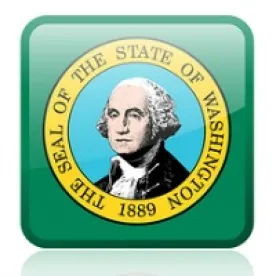This guidebook is designed to serve as an interactive reference for individuals in Washington state looking for information and resources available to help with the financial impacts of the COVID-19. It is not legal advice and the information in this guidebook is subject to change. Individuals are responsible for verifying the accuracy of all information.
1. Employment Related Benefits and Resources
a. Unemployment Insurance: Unemployment benefits will provide temporary partial income to individuals who lose their job through no fault of their own, are temporarily laid off, or have to be in isolation or quarantine due to COVID-19. Under the emergency rules enacted by the federal government, eligibility is now expanded to include many individuals not normally eligible, including selfemployed workers and those that do not meet the typically required 680 hours of work during the past 12 months. For more information on the emergency rules, visit the Employment Security Department’s COVID-19 webpage.
-
If an individual was eligible for unemployment before the emergency rules were enacted, they should apply as soon as possible. Visit the eligibility requirements webpage to determine eligibility.
-
If eligibility is uncertain, apply anyway. Complete the application, and the Employment Security Department will follow up as soon as possible.
-
If an individual was not eligible for unemployment benefits before the emergency rules were enacted, ESD has asked the applicant to wait to file until mid-April, as the system is not currently set up to accept applications under the emergency rules. Sign up for alerts on the Employment Security Department home page to stay updated on the status of the system updates.
How to Apply: The fastest way to apply is through SecureAccess Washington. To learn more about the application process, visit the application checklist and the following Employment Security Department webpage. Apply over the phone by calling 1-800-318-6022.
b. Paid Family and Medical Leave: Paid Family and Medical Leave is a new benefit for Washington workers and can be used when a serious health condition prevents individuals from working or when time is needed to care for family members. Individuals cannot collect Unemployment Insurance and Paid Family and Medical Leave benefits at the same time, even if they are eligible for both. For more information, visit the Paid Family Medical Leave website. To evaluate eligibility for Paid Family and Medical Leave use this online tool. If eligible, read the application checklist, gather the information and documents required and sign up for this benefit through the following Paid Family Medical Leave webpage.
c. Paid Sick Leave: Washington law requires employers to provide 1 hour of paid sick leave for every 40 hours worked. Workers that are ill with COVID-19 and have access to employer-provided paid sick leave should consider using that first before applying for Paid Family and Medical Leave. For more information on paid sick leave, visit the Department of Labor & Industries website. Contact employers for specific workplace paid sick leave policies.
Helpful Tip: Read this comparison guide to see what employment related benefit best fits your scenario.
2. Additional Payments Under the CARES Act
Under the CARES Act, individuals with adjusted gross income of $75,000 or less, will receive a one-time stimulus payment for $1,200. An extra $500 is also available per qualifying child. This benefit is available to all eligible individuals and is in addition to other benefits the individual may also receive such as unemployment or social security. The IRS will distribute stimulus payments and is expected to automatically begin distributing payments to eligible individuals by mid-April. For more information go to this IRS webpage.
-
Individual that filed tax returns for 2019 or 2018, will automatically receive this payment by direct deposit if the individual has provided bank account information for tax refunds otherwise a check will be sent to the address indicated on the individual’s tax return.
-
Individuals who are not required to file a tax return but have filled out a SSA-1099 or Form RRB-1099 (e.g., senior citizens, Social Security recipients, and railroad retirees), will have payments automatically deposited to their bank account where they receive their social security benefits. The IRS will not have information about dependents so the payment will not include the $500 payment for qualifying children.
-
Other individuals who are not required to file for 2018 or 2019, will need to file a simple tax return form in order to get the stimulus payment. Also, individuals who receive social security benefits and have dependent children will need to fill out the form in order to receive the $500 payment for dependent children. People with incomes of $69,000 or less can use a Free File to file their federal income taxes at no cost. To learn more visit the IRS Free File page.
-
United Way King County has a partnership with H&R Block allowing those filing a simple return to file for free. Visit myfreetaxes.com to file a tax return.
3. Housing, Utilities, and Food Assistance
a. Evictions:
-
Beginning March 18, there is a moratorium on residential evictions throughout Washington State. Landlords cannot charge fees for late or partial payment or evict tenants for non-payment of rent. Additionally, law enforcement cannot enforce existing eviction orders based solely on non-payment of rent. The state-wide moratorium is set to expire April 17, 2020, but the Governor will likely extend the moratorium check Food Family and Housing for updates on the moratorium. The city of Seattle also has a moratorium on residential evictions that extends until May 15, 2020 or until Mayor Durkan announces the end of the emergency. Visit Renting in Seattle for more information.
-
Tenants who receive an eviction notice or have a landlord that is threatening eviction due to non-payment of rent during the moratorium should submit an online complaint with the Attorney General’s Office. If they live in Seattle, tenants may also call the Renting in Seattle helpline at 206-684-5700.
b. Rent/Housing Assistance:
-
United Way of King County is working to create an online rental assistance application. Tenants must be King County residents, have a rental ledger showing non-payment, show significant reduction of income due to COVID-19, and currently have an income below50% of the King County median (based on family size and income). For further information and to enter an applicant’s email address see this Google Sign Up.
-
See the Rental Housing Association of WA website for a list of other rental assistance programs.
c. Utilities:
-
Seattle Public Utilities (SPU) and Seattle City Light (SCL) will keep utility services on during the COVID-19 Civil Emergency in Seattle. SPU and SCL customers who have been financially impacted by COVID-19, regardless of background or immigration status, can request a deferred payment plan with the utilities by calling (206) 684-3000 or sending an email on the Seattle Public Utilities website. Puget Sound Energy (PSG) will not disconnect customers for non-payment. Visit the PSG website for further information.
-
Renters and homeowners may also qualify for Seattle Utility Discount Program (UDP), which offers a 60% discount to qualified SCLand SPU customers. Eligibility depends on household size and gross monthly income. Visit the UDP website to determine eligibility and enroll.
-
New Internet access programs providing free or low cost connection are available through Xfinity, AT&T and Comcast.
d. Food Assistance/Grocery: Please see this list of Emergency food access resources. Additionally, the nonprofit WithinReach is adapting to respond to COVID-19 and can assist families and individuals in applying for food stamps, health insurance, transit passes, and other public health benefits. For assistance call the Help Me Grow Washington Hotline at 1-800-322-2588 or fill out the BenefitFinder on the WithinReach website.
4. Financial Assistance
a. Loans, Credit Cards, Debt: The Washington Department of Financial Institutions (DFI) has put together this list of financial resources. In general, DFI recommends communicating directly with lenders and credit card companies to determine what hardship programs are available. Depending on the lender or credit card company, the hardship program may include: waiving certain fees like ATM, overpayments, and late fees, as well as allowing individuals to delay, adjust, or skip some payments.
b. Emergency Student Loan Forbearance: Federal student loans are being placed on administrative forbearance allowing those with loans to temporarily stop making monthly loan payments. The suspension of payments will last until Sept. 30, 2020. Please see the Studentaid website for further information.
c. Cash Assistance
-
Washingtonconnection.org offers a fast and easy way for families and individuals to apply for a variety of services such as Food, Cash, Child Care, Long-Term Care, and Medicare Savings Programs. This website uses a single application to determine eligibility for the majority of state assistance programs and then provides direct links to apply for such benefits.
-
The Washington Department of Social and Health Services (DSHS) provides a variety of emergency assistance programs. See the DSHS Emergency Programs website for further information and to download an application.
-
DSHS maintains a Housing and Essential Needs (HEN) cash assistance program through this list of providers. The Washington Department of Commerce also suggests connecting with one of these providers if an individual is homeless or about to become homeless. Visit the DSHS HEN website to determine eligibility. Note, only adults with a physical or mental disability (including addiction or substance abuse problems) who meet citizenship, income, unemployment and other requirements will qualify.




 />i
/>i
